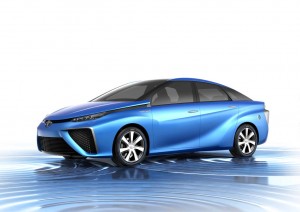Many immediately think of battery electrics when the topic of zero-emission vehicles crops up, further proving that fuel cell electric vehicles are the oft-forgotten stepchild of the segment; however, Toyota is confident it can turn the tide on fuel cells.
Confident enough that one of its top executives, Soichiro Okudaira, chief officer of research and development, recently predicted that FCEVs will “just one alternative of the eco cars” someday, according to a story in Automotive News.
Actually, he predicted it would happen in 10 to 15 years which is when the pricing will come down to levels palatable to consumers. However, in the interim, Toyota believes there is a market for fuel cell-powered cars, despite it’s “too high for the mainstream” price.
The Japanese automaker is confident that early improvements will drop the price enough to help it sell between 5,000 and 10,000 units a year once the production version of the FCV Concept goes on sale in the first part of 2015.
While no formal pricing has been released, Toyota’s suggesting the vehicle could cost about $50,000 to build. That would be about half of the expected $100,000 price tag for the car.
That’s about a tenth of what it cost Toyota to build its prototype.
Part of the reason for the drop is that they’ve been reducing the amount of platinum in in the catalyst and making the stack smaller so it can fit under the front seats. They’ve also found ways to share components with Toyota’s other EVs and hybrids to cut cost.
(Hyundai Intrado hydrogen car coming to Geneva. For more, Click Here.)
Toyota’s not the only maker betting on fuel cells, albeit the others putting far few chips in the pot. Hyundai is selling a fuel cell Tucson SUV next year, Honda will sell a five-seat fuel cell vehicle in 2015, and Daimler will roll out a fuel cell variant of its B-Class in 2017.
However, it’s not just the cost of building and buying fuel cell vehicles that draws out the skeptics. Fueling stations are fewer and farther between than battery charging stations and production of hydrogen is still fairly inefficient.
(Click Here to see what the skeptics have to say about fuel cells.)
Elon Musk, the CEO of electric vehicle maker Tesla Motors, who recently asserted there is “no way” hydrogen can become a viable alternative to battery power, never mind the well-entrenched internal combustion engine. Fuel cells, he argued, are too complex, too costly and there’s a complete lack of a production and distribution network.
“Where’s the infrastructure? Who’s going to build it,” echoed Carlos Ghosn, CEO of Nissan Motor Co., during an appearance at the Tokyo Motor Show.

